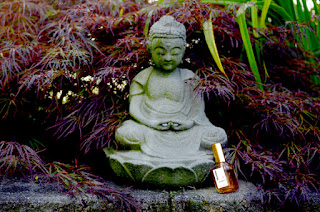Here are some realities: To sell your own perfume you need a market, people ready and willing to buy your perfume. If you are starting from scratch as a perfume maker or perfume entrepreneur you probably don't have enough loyal followers to make your perfume profitable, especially on the internet.
To sell online successfully you need dedicated followers who hang on your every endorsement and buy, when they can afford it, whatever you present to them in your name. But you don't have this kind of a following and if you put up your own website -- as an unknown perfume maker -- you will likely be disappointed by how few people come to your website and how those who do pay you a visit quickly depart, without making a purchase.
So your first step in making online sales is to put your perfume on a website that does have traffic, a website belonging to someone who has a following and whose following might buy perfume.
Now here's a tip extracted from an interview by
Jessica Sier with
Traiangl co-founder Craig Ellis. Selling online only, Triangl has been hugely successful at using Instagram to make sales. But Ellis cautions marketers to stay on their "level" when trying to get others to help promote their product. In the Instagram world, this would mean this would mean that if you have 1000 followers, you reach out to others who have 1000 followers, not people who have 100,000 followers.
To translate this into the situation of a perfume entrepreneur (you!) seeking a relationship with someone who has a strong web following of potential perfume buyers, your target should be a personality, a designer or performer, who is at the same point in their career (struggling!) as you are in yours.
This will usually mean that a good candidate might be a singer who, thought though quite professional, is only now beginning to build a following and who, at present, is far from famous.
Look what we've got so far: you, who can create a fragrance, and this other person who can influence their online following. A deal makes sense.
Here's what the deal might look like. First you have to understand that the person attracting the following will not be terribly interested in getting involved with perfume. Their interest is in their career, promoting their music or whatever. They won't want the distraction of perfume. This means that it will be all up to you.
Your first step will be to offer a proposal to the other person and get a consent for at least the outline of a deal.
Next you have to determine where you will take orders. Social media can arouse interest but to take orders you'll need a website -- the other person's website -- and if they don't have one you may have to build one for them. This can be done for a few hundred dollars.
It is essential that this website NOT be about your perfume. This site must be about your celebrity-to-be. It must highlight this person's accomplishments, give concert dates, show photos and perhaps embedded YouTube videos. You are creating an environment where you perfume can be solid. Yes, it will require work but doing it will help you better understand the person you are working with and their followers.
Now you can add your perfume to the website. And you'll add it with a payment link --
Paypal is a good starting point -- with the orders (and the money) going to you. You can settle up later with your performer by showing sales reports from Paypal.
So here's an opportunity -- a real opportunity -- to have money coming your way from the sale of your perfume. But there's one sacrifice you'll have to make. Your perfume will be marketed as the other person's perfume. You'll be the unknown genius behind the fragrance while the other person will get all the glory -- but remember, it is that other person's fame and following that will be pushing sales.
Now let's go over the logistics of this setup. Cash orders will be coming to you. You will be shipping the orders. You'll keep records of what you shipped and when you shipped it. And you'll offer your own contact information for customer service.
In short, you'll be in the perfume business: creating, marketing, and distributing. You'll quickly get it down to a routine.
But for you this need not be a one-shot deal. Once you get your systems up and running you can repeat this strategy with other rising stars. The more success you can show, the bigger the performer you'll be able to attract. The business will grow. But lay your foundation carefully. Everything you do should make your silent partner -- your performer -- look good. Forget ego. Look to the money.







